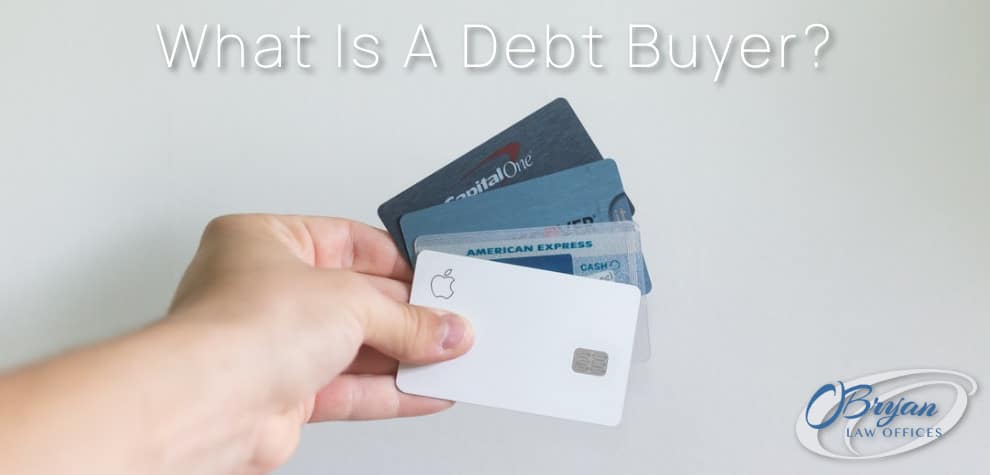Debt buying has quickly become a large industry in the United States. Most people have never heard of a debt buyer, but you may be more familiar with them than you think. If you’ve ever had to deal with debt collections, you may have also dealt with a debt buyer. However, the two are not one in the same. So, what is a debt buyer?
In this post, our experienced bankruptcy attorneys at O’Bryan Law Offices will walk you through the definition and process of debt buying and what it could mean for you. For more information, schedule a free consultation with a member of our skilled legal team.
What’s The Difference Between a Debt Buyer and a Debt Collector?
The term “debt collector” is much more common than “debt buyer.” While they center around the same concept, the two are different from one another in a few key ways. A debt collector refers to a third-party company that works to collect debt on behalf of another company. So then, what is a debt buyer?
Debt buyers are companies that actually purchase these debts from other companies and then, step in to collect it themselves. The company will buy portfolios of charged-off debt for as little as a few cents on the dollar. Once they own the debts, they will begin calling the debtor in an attempt to persuade the debtor to pay more towards their debt, so that they can make a profit.
Buying Debt
Debt buying has its pros and cons. The upside for debt buying is that you may be able to negotiate on behalf of your debt, while with a typical debt collector, you likely are not. This is because a typical creditor or debt collector loses money any time the full debt is not paid off. Meanwhile, a debt buyer can collect only 20-30% of what it is you owe and still be able to make a profit.
A debt buyer might be a collection agency who personally collects the debts they purchase or assigns the debts to another collection agency. If you know that you are dealing with a debt buyer and not a collector, start with low negotiations. Best case scenario, even a low-ball offer might work to pay off your debt.
As for cons of debt buying, there are a few. The bad news is that it can have a negative impact on your credit score. This is because, after a third party purchases your debt, a new collection account will appear on your credit report. The balance will show as $0.00 on your former account because you no longer owe money to the original creditor.
The new collection account will remain on your credit report for 7 years. This can be a downside because having collection accounts on your report will make you seem a high risk to other creditors. This, in turn, could result in higher interest rates for you and potentially lead to loan and credit card application rejections in the future.
Can You Buy Your Own Debt?
If debt buyers are able to purchase your debt at such a low cost, shouldn’t you be able to? Unfortunately, individuals are not able to purchase their own debt for pennies on the dollar like companies can. This is because no one would sell a single uncollected debt to someone. The reason that they get sold to companies at such a discounted price is because companies buy thousands of portfolios all at once.
Even in the case that an individual could afford to buy thousands of portfolios at one time, they wouldn’t be able to tell which portfolio contained their own account. Even debt-buying companies aren’t aware of the details of the portfolios they’re buying. Names and debt amounts are only revealed after the purchase.
How to Buy Debt
Some states require that debt buyers have a license before they are legally allowed to purchase debt. In the state of Kentucky, you do not need licensing or bonding to operate in this industry.
The individual or entity buying debt must have complete information regarding the validation of the debt they bought in the case that the debtor asks them to validate it. This information must include the name and address of the original creditor, the date in which your account became delinquent, and proof of the purchased debt.
Without having this complete information, they cannot legally challenge you in court and you may get off from paying your debt scot-free. This is why you should always demand that someone collecting your debt verify the information surrounding the debt fully. If they cannot do this, you’ll be able to issue them a cease and desist letter. After that, the law prohibits them from reaching out to you again.
When a debt buyer purchases a portfolio from a collector (often credit card issuers), they are taking quite a big risk. When purchasing debt, they assume they will be able to get a return on their investment with at least a few of the accounts purchased. Generally, these portfolios are a vast mixture of different levels of delinquent accounts. Some of what they buy might actually be worth something, but other accounts might just be useless.
How Much Do Collection Agencies Buy Debt For?
Debt collection feeds a $12 billion industry in the United States. Of this, credit card debt makes up 70% of the debt purchased by a debt buyer.
Debt buyers don’t just buy one debt at a time. They buy sizeable portfolios worth of delinquent debt, largely from credit card issuers. Five of the six main credit card issuers in the United States recover money on unpaid debts through debt buying. Though they may receive only a small percentage of the amount owed, it is simply a way to cut their losses.
The largest debt-buying companies buy the debt portfolios of millions of individual accounts for an average of as little as 4 cents on the dollar. So for example, say a delinquent account has an owed balance of $5,000. Companies may pay only $200 for this account. These companies could then turn around and collect most or all of the owed amount by debtors, resulting in huge profits.
How Do You Know if Your Debt Has Been Sold?
If you have credit card debt, there is a good chance that your debt could get sold to a debt buyer. Your original creditor isn’t actually required to inform you about the selling of your debt to another company. You may not even be aware until the purchasing company sends a letter informing you that they’ve acquired your debt.
If you are curious about the status of your debt, you may call the original creditor and ask about resolving it. If they tell you that they sold your debt, ask for the name of the company who bought it. You can also check your credit report to see if a buyer is reporting a collection account. The original creditor’s account should also reflect the selling of your account.
Contact our Legal Team at O’Bryan Law Offices Today!
O’Bryan Law Offices is Louisville, Kentucky’s top bankruptcy law firm. You don’t need to suffer alone through the stress of increasing debt pressure. Our firm combines an in-depth understanding of bankruptcy law and strategy with individualized, compassionate client service. If you have more questions like What is a debt buyer? or if you need legal financial help, contact O’Bryan Law Offices today. Visit our website or give us a call at 502-339-0222 to see how we can help you get your life back on track.








